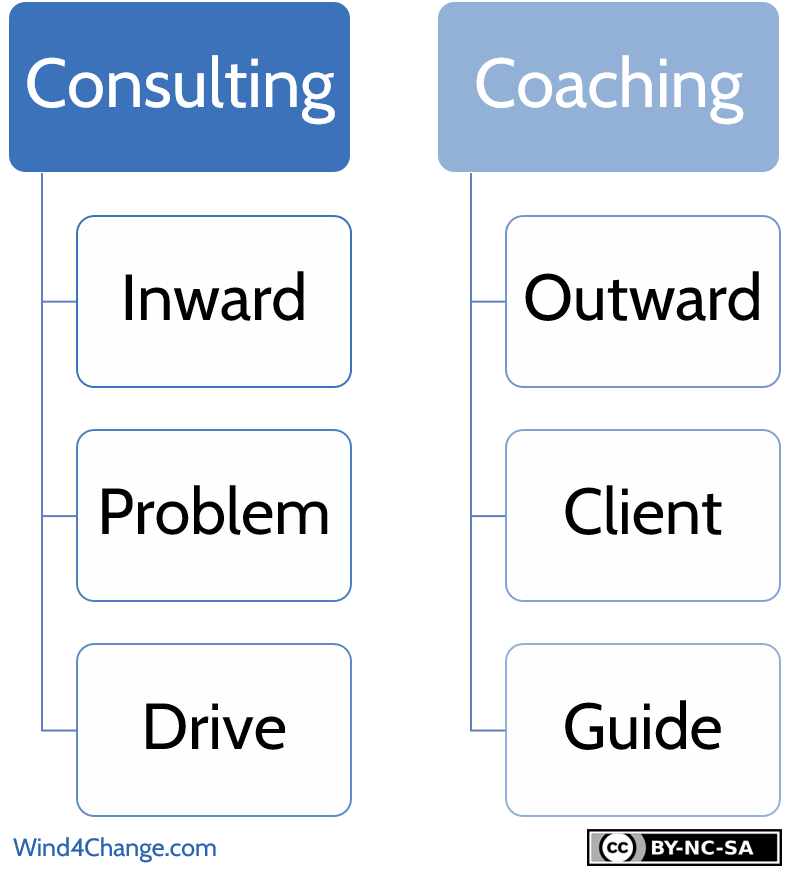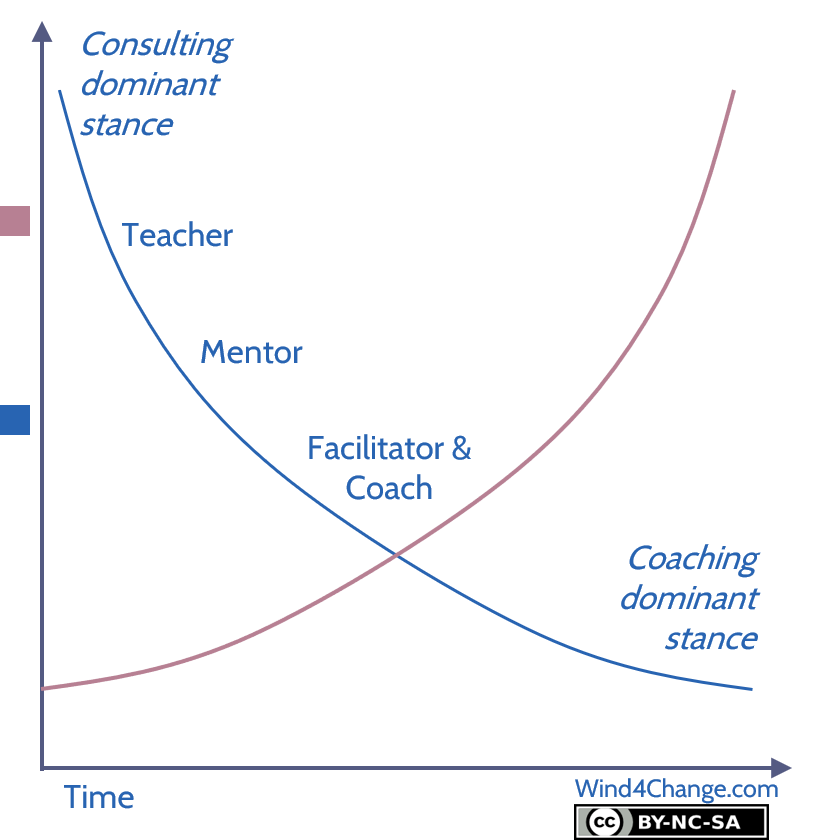What are the differences between coach and consultant? How to make the best of coaching and consulting? Dig out in this post the changes in stance, mindset and competence over a transformation: teacher, mentor, facilitator and finally coach!
- What is best: consulting or coaching? What are the differences between coach and consultant?
- Making the best of coach and consultant: adapting stance between consulting and coaching by the transformation
- Stances of the Change Agent over the transformation from consultant to coach
- What's next? Learn more about Change Management and discover Coaching
- Do you want to learn more about the differences between consulting and coaching? Here are some valuable references
What is best: consulting or coaching? What are the differences between coach and consultant?
Of course this is not a real question but more a teasing. Nevertheless, for some people it can trigger hot and endless debates but this is not the mindset of this blog.

For the need of this explanation we will simplify these roles to point out the major differences:
- First, inward/outward
- In consulting, the expertise required is coming from the consultant. The consultant is expected to provide answers, recommendations and the client will select preferred options.
- In coaching, the expertise required is coming from the client. The coach pulls answers and explores with the client possibilities.
- Second, problem oriented/Client oriented
- Consulting is focused on a problem to be fixed.
- Coaching is focused on a client and his/her capacities to build.
- Third, drive/guide
- In consulting when involved in the implementation phase, the consultant will drive or at least strongly support the change.
- In coaching, the coach will only guide the change. Resources built with the coaching are coming from the client.
Making the best of coach and consultant: adapting stance between consulting and coaching by the transformation
Do not make them reinvent the wheel regarding Agile, Agile at Scale and Change Management, be in consulting mode when required:
- Provide expertise on theory and from the field on Agile and Agile at Scale.
- Provide expertise on Change Management.
- Facilitate the transformation but leave them the lead:
- Capture workshop output but let them share.
- Prepare draft status about the transformation but let them present.
Progressively switch stance to make them owners and actors or their transformation, move to coaching mode as soon as possible:
- Leverage their expertise about their Team and Tribe whenever design phase starts.
- Leverage their capacity as change workforce to multiply the impact.
- Build the sustainability of their transformation, training them as pillars of the change.
Stances of the Change Agent over the transformation from consultant to coach

The stance changes over the time from consulting dominant to coach dominant stance as the need for expertise switches from Agile and Agile at Scale to Team or Tribe context. It is also a natural change of stance that supports empowering transformees on their change and build skills and capacity to sustain the transformation.
What are the stances that the Change Agent passes trough during the transformation?
- First, training: he/she delivers training mixing theory, participation and practice on Agile and Agile at Scale frameworks and related principles, value proposal and practices.
- Second, mentoring: he/she closely supports the start of the transformation leveraging his/her own expertise and experience with Agile and Agile at Scale as a trusted guide and advisor.
- Then a switch occurs: Agile and Agile at Scale frameworks are instantiated to the Team or Tribe context. The Change Agent turns to a facilitator and professional coach stance:
- Facilitator: guides the Team and the Tribe over a discovery process sticking to their objectives and success criteria. Facilitation is on specific topics and on the transformation process itself.
- Professional coaching, as defined by the International Coach Federation: “partnering with clients in a thought-provoking and creative process that inspires them to maximize their personal and professional potential”. The coach is the expert of the coaching approach, the client on the topic that is at stake. Here the Change Agent will enter areas that may be outside the initial and official mandate like helping a manager to move from command & control to delegate & empower mode.
The change agent has to master the different stances and related competencies of coaching and consulting. In addition, he or she has to known how to adapt the posture to the context of the transformation. Really, it is important to deliver effective change management in agile or other fields, at team or enterprise level.
What’s next? Learn more about Change Management and discover Coaching
Discover my other posts on the influence model and the change model. Find all the posts about Change Management here and about Coaching here.
Do you want to learn more about the differences between consulting and coaching? Here are some valuable references
- Post from Forbes: Key Differences Between Coaching And Consulting
- Post from 501Commons.org: What’s the Difference Between Coaching & Consulting?
